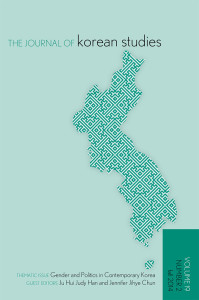From the introduction to THEMATIC ISSUE: GENDER AND POLITICS IN CONTEMPORARY KOREA, BY Guest Editors Ju Hui Judy Han and Jennifer Jihye Chun
The election of Park Geun-hye (Pak Kŭnhye) as South Korea’s first female president reveals fascinating contradictions about the state of gender and politics in contemporary South Korea. For some, Park’s victory on December 19, 2012, signified a historic achievement in a country with one of the worst records on gender equality in the world. The same year that Park won the presidency, South Korea ranked a dismal 108th out of 135 countries on the World Economic Forum’s Gender Gap Index (GGI), which measures the magnitude and scope of gender-based disparities in education, health, welfare, the labor market, and political empowerment.1 Although the most contentious election issues focused on national security and economic issues, rather than ongoing gender discrimination and inequality, news outlets called attention to the gendered significance of Park’s victory in a “deeply patriarchal part of Asia” and a country that ranks among the lowest in the world in gender equity.
Park’s victory as head of the conservative Saenuri Tang (New Frontier Party) also underscored the continued stronghold of old guard anticommunist politics, represented most acutely by her connection to her father and former president Park Chung Hee (Pak Chŏnghŭi), who seized power in a 1961 military coup and ruled continuously until 1979. By symbolizing the kind of leadership associated with her father’s heavy-handed rule during the country’s rapid industrialization continue reading.
READ the ENTIRE Journal here (UofT Connection)
